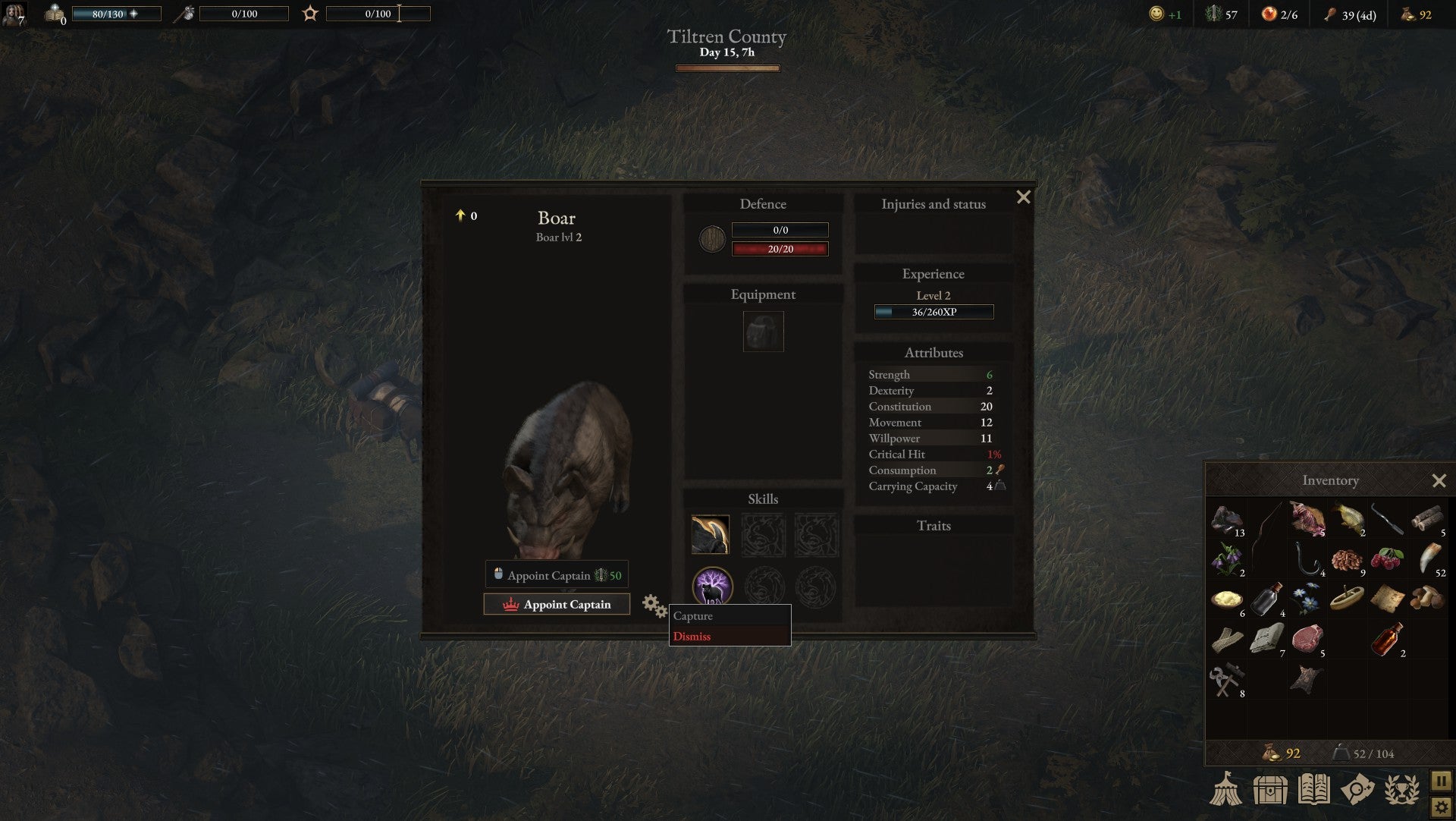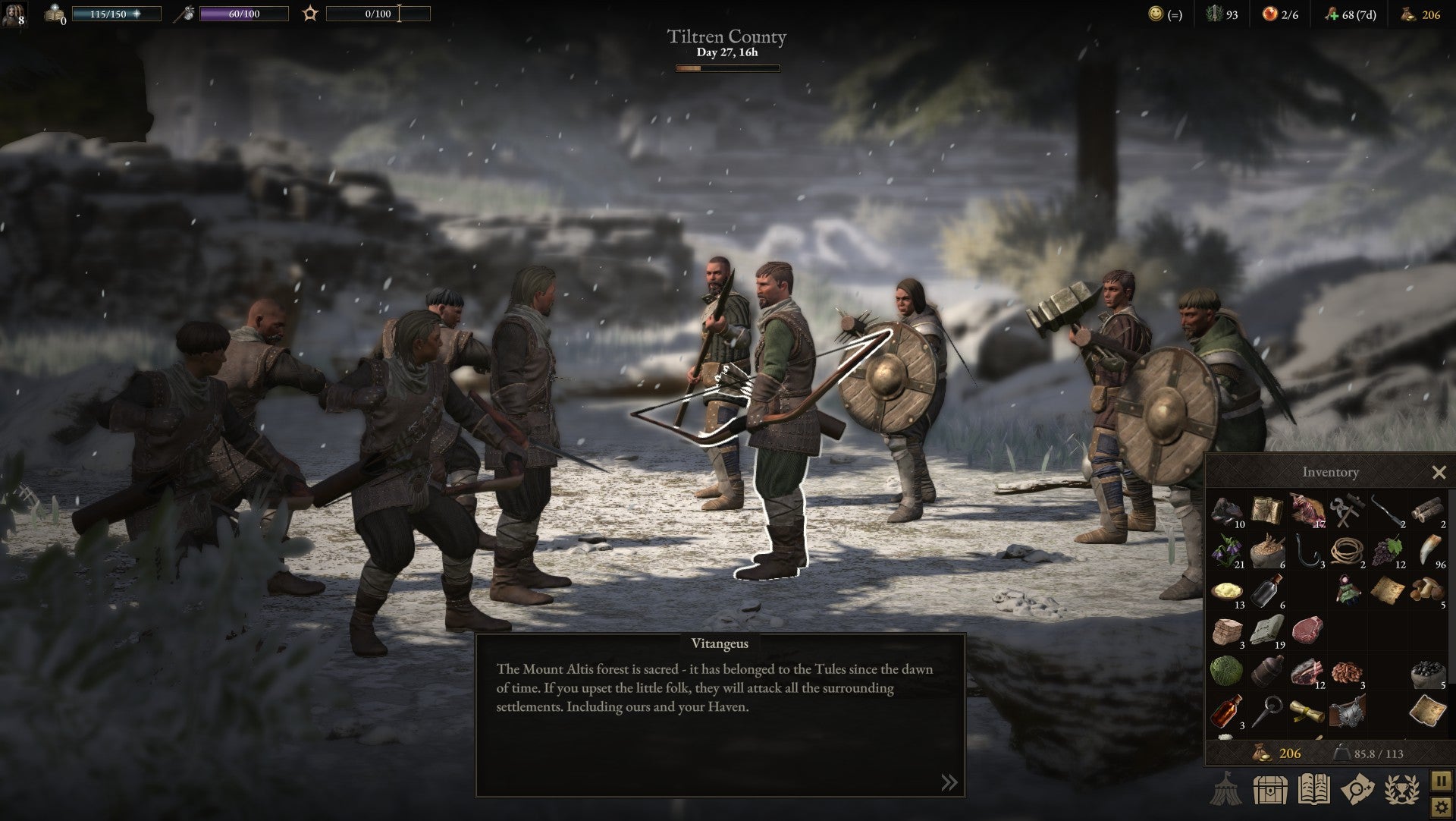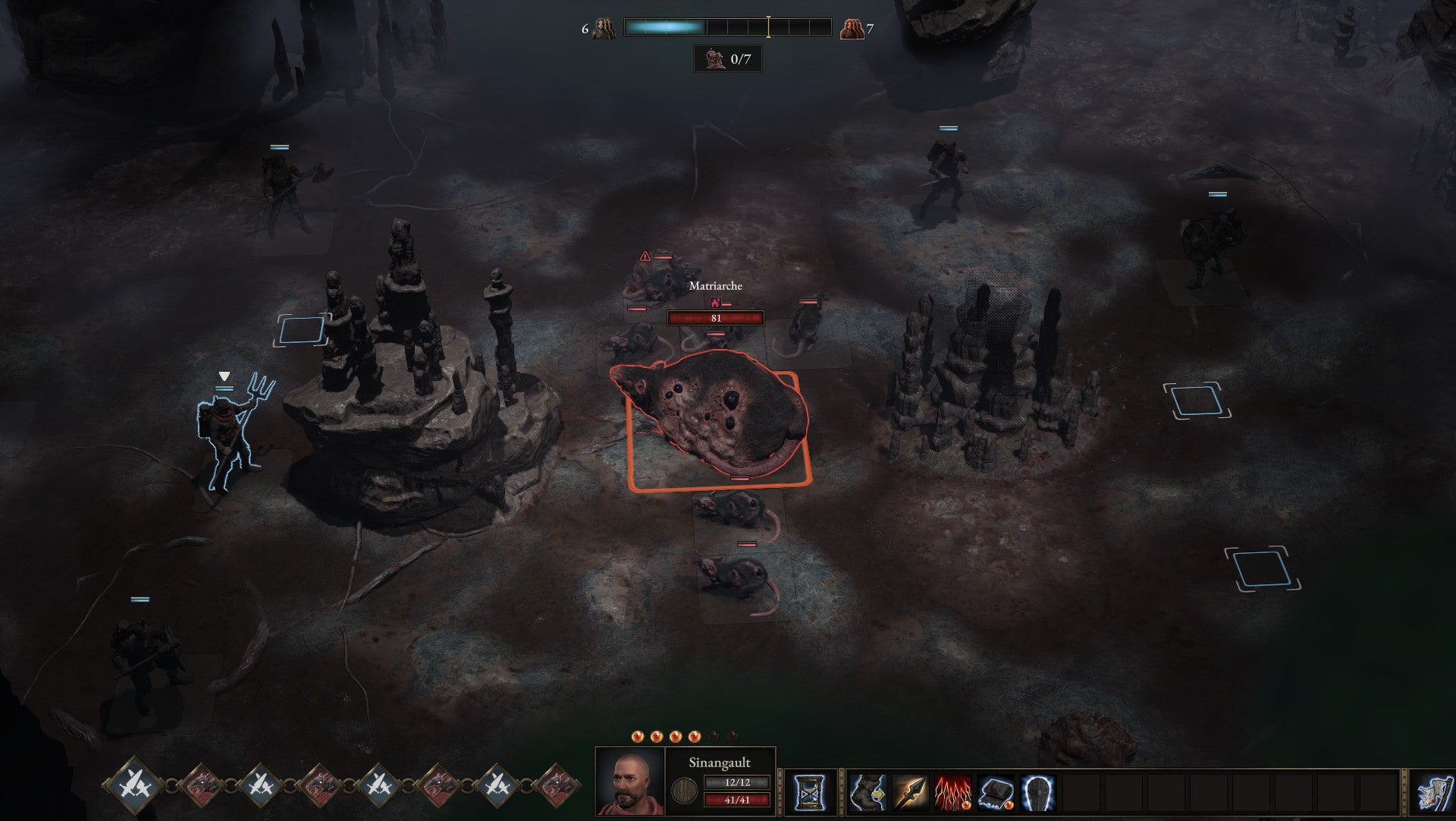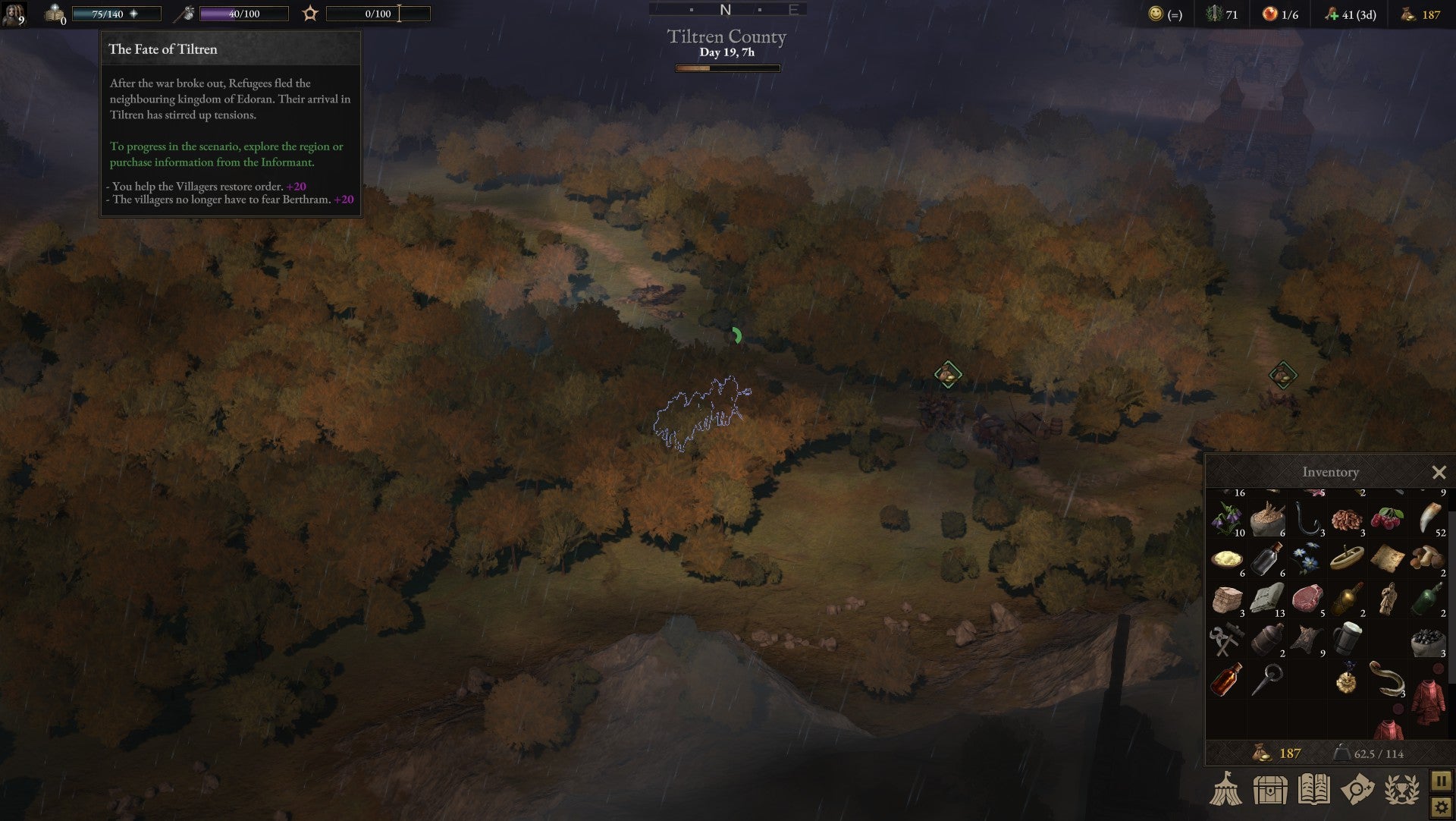I’d recruited that boar in the first place by knocking it out and tying it up with a length of rope I found on a dead bandit. Wartales did not inform me this was a possibility until the moment it happened. The game bristles with texture like this; lovely emergent gemstones that form when small details from different systems bear down on each other. Don’t worry too much about all that, though. Most of your day to day worries in Wartales are about where the next bag o’coin or leg o’lamb is coming from, and whether you can get your favourite archer healed up before that nasty shiv wound contracts everyone’s least favourite plague: the plague. Wartales gives you a welcome sense of freedom in how you pursue these objectives in its open world setting, so here is a story about beans. You need to keep your troupe fed as you prance o’er hill and dale for a spot of strenuous boar-napping, so I got into the habit of making sizable investments in BeanCoin at the market. As you travel, you’ll encounter other groups wandering around the world. There’s a touch of Mount and Blade about it, as groups will move around and occasionally attack each other dynamically. Some of the groups are refugees. The game lets you feed them beans in exchange for prestige, which you can then spend on haggling contracts, revealing quest markers, or recruiting and promoting mercs. Brilliant, said I, as I was immediately transported back to when I first discovered those miniature individual swiss rolls at Tesco that cost 15p each. At the time, I had wild ambitions to fill up a bin bag with hundreds of them and creamily swirl my way down the highstreet chucking out fistfuls at pedestrians, like a big bountiful cake lord. So I stopped killing things in Wartales for a bit and became a roving bean philanthropist, greedily farming prestige. Through this act of self-servingly conspicuous charity, I realised with no small amount of horor that I had accidentally become what the Daily Mail thinks charities are actually like. Then I realised that, no: the end justifies the beans. Eventually, I ran out of money, so it was time to get back to some profitable violence. You’ve got options here. Hang around the woods hunting wolves. Sell their teeth. Make wolf sausage from their sausagey bits. Use their leather to make clothes and sell the clothes back to the blacksmith. Or, sod the wolves, mine some iron ore through a delightful minigame, smith some lockpicks, and go crime-bezzling wheat from locked chests owned by poor farmers, if you don’t mind hiding from guards for a spell. As we’ve established, though, I’m the kind of coward who shuns boar leadership. So I opted for the structured comfort of contract killings. Wartales’ turn-based tactics have a focus on positioning that has you thinking more laterally than your average cover ’n’ flank-fest. Melee engagements, for example, forces participants into locked combat, and disengaging from said lock means the other gets a free opportunity to attack. This means you can engage an archer so they’re forced to use their useless fists or eat a free attack, for example. A turn counter lets you know which foes are up next, too, so you can lay down an overwatch cone with your spearman to halt the next attacker in their tracks. There are also bonuses for fighting side by side with allies, or surrounding foes, but this applies to your enemies as well. As a result, letting your squishier daggerchaps get isolated will end badly, very quickly. Ultimately, you’re rewarded for considerate navigation of otherwise flat and terrainless spaces, for bulwarking and backstabbing, buffing and debuffing. A gripe here, and one I find is true of a lot of games that feature turn-based tactics as just one feature among many: sometimes, fights can run too long. I once fought around 15 rats. Fifteen! In the early game, lower level characters have few abilities to spice things up, and so the drudgery of move/attack/wait is felt all the more keenly when the ‘wait’ portion means waiting for fifteen rats to move. Fifteen! That’s too many rats, man! Happily, weapons feel very different from each other from the outset, which does negate some early game plodding. Alongside the combat, Wartales offers a sort of faction-based RPG/strategy layer, where you’ll be making decisions to guide the direction of quests. Characters and dialogue aren’t especially interesting, but I found myself quite invested in the actual decision-making. It’s all very “thief steals a sack of swiss rolls to feed their starving family” stuff, but there are some reasonably fleshed out moral conundrums between the haves and have-nots. And there’s something about grimy low fantasy that just makes this stuff sing. It’s somewhat of a survival game, too. Less the type of survival that has you single-handedly hatcheting the homes of scores of woodland animals to firewood, and more the essence of carving out a space for yourself. Of making you live in the world you’re inhabiting; planning routes, packing provisions, thinking about the return journey, and creating your own mini-objectives because sometimes it’s worth just deviating from the critical path to stock up on a particular resource. The routine pleasures of a cyclical existence on the edge rather than a straight shoot to glory measured out in quest-journal ticks. Here are some general complaints that I imagine will likely be fixed while the game goes through early access. Quite a few of the ability descriptions are still in French. I kind of appreciate the romance of making life or death tactical decisions based on cool sounding French words I can’t read, though. Le overwatch? What the hell is that?! Also, battles in my review build could be quite stuttery. I never had a crash, but I did frequently think things were about to. The start can be quite rough until you figure out what you’re doing, too. Some of the nuance, such as working out exactly what keeps your companions happy enough to not desert, is opaque. Although whether this is a true negative depends on how you look at it. It’s a time investment, sure, but I’ve started seeing this sort of approach to design as a value proposition recently: the added bonus of a one-time-only discovery tour while you poke around a fresh world where everything is new and most of it is dangerous. It’s for this reason I decided to start the game again after a good chunk. To try more thievery, to play a bit less cautiously. Promote a boar or two. And it’s here that I discovered just how excited I was to start again, to really clinch an optimal first few hours. Wartales nails the restart, and not all games can claim that. I could point to the depth of systems or an approach to design that trusts the player enough to let them discover things themselves. These are both true to some extent. But I think the most useful thing to impart about Wartales is that it just has, well, a certain special something. Maybe there’s some cool sounding French for that that I’m forgetting. The fact that it’s far from finished has me very interested indeed. Moar acorns, please.




